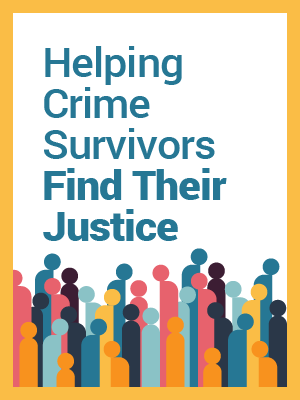Archival Notice
This is an archive page that is no longer being updated. It may contain outdated information and links may no longer function as originally intended.
Advancing Services Through Technology
The victim services field must diversify and expand existing strategies for providing victim assistance and create vital links to other fields that come into contact with victims of crime.
OVC encourages the use of technology to respond to and expand on the successful growth in technological capacity to provide victim services.
OVC’s Advancing the Use of Technology to Assist Victims of Crime Program supports grantees in developing innovative strategies to create, expand, or enhance the use of technology initiatives to improve responses to, and services and access for, victims of crime. First released in FY 2017, OVC has since funded 37 grant awards totaling more than $49 million—including 12 awards totaling $12.8 million in FYs 2021 and 2022—for organizations to provide access to victim services in areas where local or accessible services are not sufficient to meet the needs of the community.
Grantees are using funds to—
- increase one-on-one victim support through the Identity Theft Resource Center’s national hotline.
- offer free sign language services through virtual technology.
- enhance the National Sexual Assault Online Hotline.
- expand VictimConnect's services.
- extend the StrongHearts Native Helpline's hours of operation and implement digital (chat) services.
- create a survivor-informed website and mobile application for adult survivors of child sexual abuse.
- create an online portal for crime victims and survivors with a case in the adult or juvenile justice system.
- improve accessibility, facilitate higher engagement, and lower barriers to service access for victims of crime in Philadelphia.
- expand a website for victims of gender-based violence.
- develop and launch the first pro bono virtual legal advice and resources platform specifically focused on the needs of victims of hate and bias crimes, including online gender-based abuse, harassment, and violence.
- develop a self-help mobile app for victims of violent crime.
Between FYs 2021 and 2022, grantees completed 153 system-level IT improvements and developments and trained 484 program staff members on the improvements. In addition, grantees completed 48 data-gathering initiatives. Planning documents that were completed include action plans, data collection plans, and both internal and community-focused needs or strengths assessments. These grantee organizations collaborated with an average of 70 partners per quarter in FY 2021 and an average of 40 partners per quarter in FY 2022 as a result of grant funding. Additionally, 105 trainings were provided to 4,500 participants and 215 technical assistance requests were completed for 2,361 recipients.
A total of 23,308 victims (both new and returning) were served in FY 2022, with 17,524 individuals receiving services for the first time. Domestic and/or family violence; identity theft, fraud, or financial crimes; and stalking or harassment were the most common victimizations reported. Among services provided to victims, hotline or crisis counseling (29,218 occurrences); referral to other services, supports (14,105 occurrences), and resources; and referral to other victim service programs (10,580 occurrences) were most commonly reported.
Read a 2021 report from an OVC grantee—the National Network to End Domestic Violence—that includes findings from a needs assessment conducted at the end of 2020 to determine how crime survivors and their communities have experienced “tech abuse” during the COVID-19 pandemic.
In FY 2019, OVC created a similar program for VOCA Formula State Administering Agencies—the Building State Technology Capacity and Elder Abuse Hotlines program. The original eight grantees were joined by another five in FY 2021 and four more in FY 2022. They are implementing statewide technology programs to enhance victims’ access to services, foster innovation and efficiency in providing services, improve the quality of services, and improve the accessibility and responsiveness of victim service organizations.
In FY 2021 and 2022, 20 grantees completed 76 system-level IT improvements and developments and trained 647 program staff on the technology. They also implemented 63 improvement initiatives and completed 42 project deliverables, including completion of a cloud-based system to submit and manage victim compensation applications, expansion of several statewide automated victim notification systems, development of an online victim training academy, and improved case management systems to enhance victim service providers' abilities to collect and manage data.
Telehealth
OVC continues building on its support for telehealth initiatives to provide victims of sexual assault with specialized medical practices such as forensic exams. In FY 2016, OVC first provided funding under the Using Telemedicine Technology to Enhance Access to Sexual Assault Forensic Exams program, through which Pennsylvania State University developed and implemented the Pennsylvania Sexual Assault Forensic Examination and Training (SAFE-T) Center. Then, in FY 2019, OVC awarded grants totaling nearly $18 million to four demonstration sites and one TA provider under the Using Telehealth to Improve Care, Access and Quality of Sexual Assault Forensic Exams program.
The demonstration sites included Texas A&M University’s Texas Teleforensic Remote Assistance Center, Avera Health’s eSANE for Rural program, Tundra Women’s Coalition Yukon-Kuskokwim TeleSAFE Project, and the University of Arkansas’ Sexual Assault Forensic Examiner Network for Evidence-based Telemedicine—all of which joined the SAFE-T Center at Penn State University to increase access to high-quality forensic care for victims of sexual assault in rural and underserved areas.
In April 2022, the SAFE-T Center released a final report detailing 5 years of the planning, development, and implementation of a comprehensive teleSANE program to enhance access to quality sexual assault care for adolescents and adults in rural and underserved communities. The report indicates that the SAFE-T Center created comprehensive SANE coverage in rural areas where it previously did not exist; increased nurse perception of quality of care; and stimulated local stakeholder partnerships, enabling significant system-level changes that support and sustain local SANE teams, leading to high SANE retention rates.
In FY 2021 and 2022, the 4 demonstration sites completed 57 system-level IT improvements and trained 183 staff members on the new technology. These sites worked with an average of 110 partners per quarter, and an average of 58 partners per quarter used evidence-based programs or practices. Common programs and practices implemented include Texas Evidence Collection protocol, SANE protocols and policies (e.g., trauma-informed care), Eye-Movement Desensitization and Reprocessing therapy, and Trauma-Focused Cognitive Behavioral Therapy.
The International Association of Forensic Nurses was awarded funding ($2.2 million) to provide TA to the demonstration sites as they began planning and implementing their telehealth programs. In FY 2021 and 2022, 60 trainings were conducted for 583 participants, including victim advocates, educators, medical professionals or health care providers, and mental health providers. The TA provider responded to 440 TA requests that supported 2,188 recipients; completed 69 data-gathering initiatives; and disseminated 67 informational resources.
Also in FY 2019, OVC funded a 3-year program to address elder abuse and financial exploitation under the Field-Generated Solutions for Tribal and Non-Tribal Communities to Improve Services for Victims of Crime: Innovations in Telehealth program. OVC competitively funded the New York City Department for the Aging, in partnership with Weill Cornell Institute of Geriatric Psychiatry, to deliver an internationally recognized evidence-based mental health intervention to elder abuse victims and victims of crimes committed by strangers, who screen positive for depression. The Tele-PROTECT (Providing Options To Elderly Clients Together) program offers a psychotherapy treatment program remotely and efficiently, using a secure internet platform to communicate with senior victims.
The Tele-PROTECT program served 220 victims (both new and returning) with 122 victims served for the first time in FY 2021 and 2022. The most common victimizations reported were elder abuse or neglect; adult physical assault; and identity theft, fraud, or financial crimes. The main service provided was individual counseling (833 occurrences).




